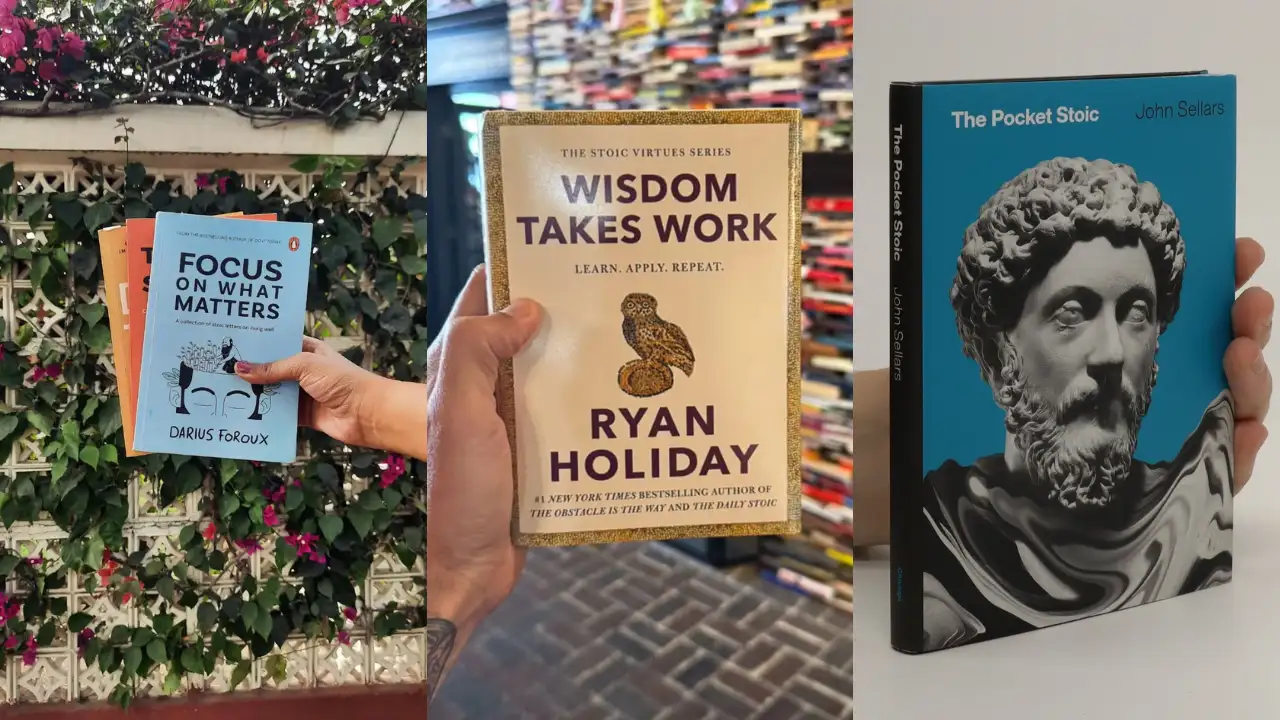Copyright timesnownews

Life doesn't send warning texts before it knocks you down. One day you're coasting, the next you're flat on your back, wondering what happened. Here's the thing, though: about 2,000 years ago, some incredibly tough philosophers figured out how to stay standing when everything around them was falling apart. The Stoics weren't just thinkers sitting in comfortable chairs. They were soldiers, slaves, and emperors who faced real chaos and developed practical wisdom that still works today. These eight books aren't about positive thinking or quick fixes. They're about building the kind of mental strength that makes you unshakeable when life decides to test you. Consider this your toolkit for the hard days ahead. Also Read: 8 Stoic Books That Speak Louder Than Any Modern Self-Help Guide 1. Stay Calm with Seneca by Jana Capri and Charan Diaz Two writers curate and contextualise passages from Seneca's letters and essays, making the Roman Stoic's wisdom accessible for readers seeking calm amid contemporary chaos. Jana Capri and Charan Diaz organise Seneca's teachings thematically, addressing anxiety, anger, loss, time management, and relationships, showing how his advice remains relevant two millennia later. They provide historical context about Seneca's life, including his time as Nero's advisor and his eventual forced suicide, demonstrating how he practised the philosophy he taught, even facing death. The book presents Seneca's insights without academic jargon, making clear why his particular brand of Stoicism resonates today. 2. Wisdom Takes Work by Ryan Holiday The popular Stoicism writer presents daily practices for developing wisdom through consistent effort rather than waiting for inspiration or enlightenment. Ryan Holiday argues that wisdom is not an innate gift but a skill developed through deliberate practice, reading, reflection, and applying philosophy to real situations. He emphasises that Stoicism is an active discipline requiring daily work, not a passive collection of quotes or intellectual exercise divorced from action. The book provides frameworks for making wisdom practical, including reading strategies, journaling prompts, and methods for testing philosophical principles against lived experience to discover what works rather than accepting ideas uncritically. 3. Focus on What Matters by Darius Foroux A productivity writer applies Stoic principles to modern life, arguing that focus requires eliminating distractions and prioritising what you can control. Darius Foroux draws on Marcus Aurelius and Epictetus to show how ancient wisdom addresses contemporary overwhelm from social media, endless choices, and constant demands on attention. He emphasises the Stoic dichotomy of control, distinguishing between what is up to you and what is not, channelling energy toward actions rather than outcomes. The book provides practical strategies for implementing Stoic ideas, including journaling, morning routines, and saying no to commitments that do not serve your values or goals. 4. The Inner Citadel by Pierre Hadot A philosophy scholar provides a deep analysis of Marcus Aurelius's Meditations, explaining the emperor's personal journal as spiritual exercises rather than a systematic treatise. Pierre Hadot examines the structure and recurring themes in Marcus's reflections, showing how the Meditations function as a daily practice of Stoic principles, reminding himself of philosophical teachings to maintain equanimity while ruling an empire. He explores Marcus's use of metaphor, his conception of the universe as a unified whole, and his understanding of reason as connecting humans to cosmic order. Hadot's scholarly approach requires patience but rewards readers with a profound understanding of Stoic practice as a lived discipline rather than abstract theory, showing philosophy as a way of life. 5. Being Better: Stoicism for a World Worth Living In by Kai Whiting and Leonidas Konstantakos Two philosophers apply Stoic principles to contemporary global challenges, including climate change, inequality, and political polarisation, arguing that ancient wisdom offers a framework for collective as well as individual flourishing. Kai Whiting and Leonidas Konstantakos extend Stoicism beyond personal resilience to social responsibility, showing how Stoic cosmopolitanism, ecological thinking, and virtue ethics address modern crises. They argue that focusing only on what you control does not mean ignoring injustice, that Stoic acceptance does not equal passivity, and that caring for the whole requires engagement with systemic problems. The book challenges narrow interpretations of Stoicism as merely a personal coping strategy, recovering its radical potential for imagining and creating a better world grounded in reason, justice, and recognition of shared humanity. 6. The Pocket Stoic by John Sellers A compact collection of Stoic quotations and brief commentary provides quick access to ancient wisdom organised by topics including adversity, anger, death, and virtue. John Sellers curates passages from Marcus Aurelius, Epictetus, Seneca, and other Stoic philosophers, offering portable reference for daily inspiration and practical guidance. The book's format allows readers to dip in for specific issues they face, finding a relevant Stoic perspective quickly without reading complete philosophical texts. Sellers provides minimal but helpful context, explaining enough about Stoicism for newcomers while letting the ancient voices speak directly. Its accessibility makes philosophy practical, turning abstract principles into daily tools for navigating challenges with equanimity and wisdom. 7. Leisure: The Basis of Culture by Josef Pieper A German philosopher argues that genuine culture requires leisure understood not as idleness but as contemplative space necessary for wisdom, art, and meaningful life. Josef Pieper critiques modern society's total work orientation, showing how productivity culture destroys the reflective capacity necessary for philosophy, creativity, and human flourishing. He distinguishes leisure from entertainment or recreation, describing it instead as openness to reality, willingness to receive rather than constantly produce, and creating mental space for wonder. The book connects to Stoic concerns about living well, about distinguishing essential from trivial, and about cultivating an inner life resistant to external pressures demanding constant activity without space for reflection or meaning-making. 8. Epictetus: A Stoic and Socratic Guide to Life by A.A. Long A classics scholar examines Epictetus's teachings, showing how the former slave became one of Stoicism's most influential voices through his emphasis on freedom, choice, and internal control. A.A. Long analyses Epictetus's Discourses and Handbook, explaining his arguments about what is truly up to us versus what is not, how to maintain freedom even under constraint, and why desiring only what is within our power eliminates suffering. He explores Epictetus's Socratic method of questioning assumptions, his practical approach to ethics, and his belief that philosophy must change how you live rather than just how you think. The book makes Epictetus accessible while honouring philosophical complexity. Also Read: 8 Profound Books on Stoicism to Guide Your Personal Development You've just walked through centuries of battle-tested wisdom, and here's what matters most: these aren't just books to read and forget. They're training manuals for your mind, and the real work starts when you close the last page. The Stoics understood something we keep forgetting: external circumstances will always be messy and unpredictable, but your response belongs entirely to you. That's your superpower. When life throws its next punch, and it absolutely will, you won't just survive it. You'll stand there knowing exactly what to do because you've learned from people who faced worse and came out stronger. These books connect you to an unbroken chain of resilience stretching back millennia. Now you're part of that chain too.



